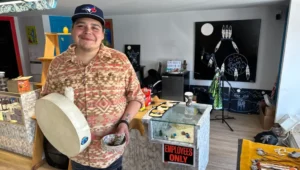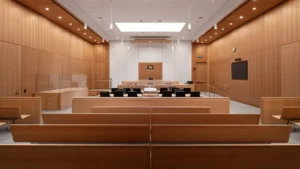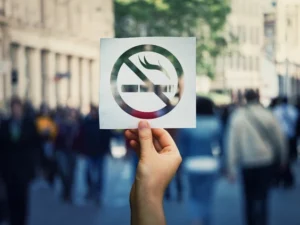An interview with Kristina Lopez Adduci, cannabis entrepreneur
From Jezebel by Shannon Melero June 23 2021
Kristina Lopez Adduci, the Jersey-born Puerto Rican founder of a cannabis accessory company called House of Puff, has long believed in the usefulness of cannabis, and she has built her business to highlight the beauty of it. Adduci started the company shortly after she had started smoking cannabis for the first time and she was unable to find beautiful, feminine “cannabis accessories” to smoke out of. “The problem was that I was smoking out of these phallic pipes that they sold in the head shops down in St. Marks,” Adduci said on a call with Jezebel, referring to the street in Manhattan. “I was a well-to-do New York art collector, I’m not smoking out of that.”
Thus Adduci worked to create accessories that catered to herself and her friends, fellow art lovers who were interested in something beautiful but also functional. But Lopez’s business is merely the entry point of her larger work in the cannabis space, which is to seize on the decriminalization of cannabis and push for it to be nationwide. Moreover, Adduci wants to see the people who have been most negatively affected by the government’s at-home war on drugs, Black and Latine people, become the industry’s greatest beneficiaries. Adduci was adamant that through grassroots efforts and legislation the cannabis industry “can lead to generational wealth” for Black and Latine communities.
During the 2020 election cycle, the clear winner across a number of local races was cannabis. In total, five states—Arizona, New Jersey, South Dakota, Mississippi, Montana—voted for legislation that would allow for the use and possession of recreational cannabis without fear of arrest and prosecution, joining states like California and Colorado. While this was a legislative win for cannabis lovers and salespeople alike, the immediate reaction from advocates was to ask what this change in policy meant for the thousands of men and women sitting in prison for cannabis-related charges.

Since 1970, when all uses of marijuana became illegal under the Controlled Substances Act, Black and Latine people have been arrested and prosecuted at a higher rate than white offenders. According to the Drug Policy Alliance, 50 percent of federal drug cases are brought against people classified as Hispanic, even though we make up 17 percent of the population. The state of New York, where Adduci and her business are based, has the highest rate of arrests for cannabis-related charges in the entire country—a statistic that contributed to Governor Andrew Cuomo’s decision to legalize cannabis in April. Despite the prevalence of cannabis in indigenous communities and its many medicinal uses, the plant has been vilified as a gateway drug, particularly by elders of color who instill in their children that a single run-in with the police can ruin or in some cases end their lives. Adduci, who grew up in a Puerto Rican Pentecostal home, recalls these conversations and says that to this day she’s not told her father that she smokes cannabis recreationally.
As the narrative surrounding cannabis shifts, so must the various business models surrounding its sales. Soon enough, everyone’s local weed guy who deals in secret on the corner will in effect be a small business owner, whether they want to or not. As cannabis distribution becomes legal and restrictions lift, new taxes and rules of sale will be put in place. Adduci believes that this is a key moment for communities of color to get in on the ground floor of a soon-to-be-booming industry. “Latinos, we gravitate towards starting our own businesses,” Adduci says. “We want to be our own boss and being an entrepreneur is a powerful way to do that and enact change.” Adduci thinks that the way to achieve that is to mindfully create opportunities for growth in communities of color by “supporting an equity-focused initiative” in both her work and her advocacy. This is an especially important moment for young people who have the technical savvy to make space for themselves in the industry and “generate wealth which with they can restore their communities.”
But she also recognizes that the barrier between success in the cannabis industry and most people of color is an unjust policing system that arrests Black and Latine cannabis users at a higher rate than white users. One small blight on a criminal record can shut hundreds of doors to capital for a new business or something as simple as a retail job. “The only way we can really [seize on this opportunity] is to harness our numbers and back each other up at the ground level,” Adduci says. “It’s about building your network and then eventually hiring other people of color and cultivating an inclusive community.”
New York’s Marijuana Regulation Taxation Act has created a blueprint for legalizing cannabis that includes a pathway for some offenders to get their records expunged, which Adduci says is the first step to clearing the way for people of color in the industry. “That’s part of the problem in the cannabis industry, people want to get in, they want to invest and have some skin in the game but Black and brown people are being blocked because of their records whereas white men who already had money and investment and never got arrested can just waltz right in,” Adduci explains. These business-literate white men aren’t just waltzing into a business opportunity they’re waltzing into a newly minted billion-dollar industry. According to the New York Times, the cannabis industry in Nevada alone is projected to do a billion dollars in sales all as a result of the covid pandemic, a pandemic that disproportionately affected communities of color. It’s hard to pick up a side hustle when your main hustle involves fending off a virus without adequate access to healthcare or in some cases food.
A clean record, though, is only the first step in a longer path that Adduci believes can lead to generational wealth. The next step is the willingness to take the risk and there’s more than enough room in the world of entrepreneurship for people of color to stake their claim; according to a 2019 Congressional report, “60 million Latinos in the US already account for two point three trillion in economic activity.” But mainly, what communities of color need in order to seize on the cannabis business boom that they created in part is restorative justice. The Minority Cannabis Business Association took a similar stance in June of 2020, releasing a statement that called for Portland, Oregon to “divest the Portland Police Bureau from any and all cannabis dollars meant for the investment in communities historically over-policed.”
Adduci says, “It’s about research, education. It’s about giving us the chance. It’s about leveling the playing field. Right? And it’s about attempting to right the wrongs because at the end of the day this is just one thing. There are hundreds of laws that disproportionately affect Black and brown communities and if we can be the ones to reinvest in our own communities,” then the “green rush” is just the beginning.
















Comments are closed.